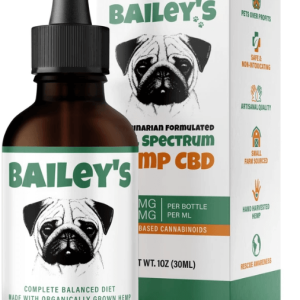CBD oil has become increasingly popular in recent years, and pet owners are now turning to it as a natural way to relieve their furry friends’ pain, anxiety, and other ailments.
While CBD oil can offer many benefits to dogs, it’s essential to understand the side effects of CBD in dogs. As a responsible pet owner, it’s crucial to know what these side effects are and how to minimize them.
One of the most common side effects of CBD oil in dogs is lethargy. Dogs may become more relaxed and sleepy than usual after taking CBD oil. Other side effects may include vomiting, diarrhea, and dry mouth.
However, these side effects are relatively rare and typically mild. It’s essential to remember that every dog is different, and some may be more sensitive to CBD oil than others.
Therefore, it’s crucial to start with a low dose and gradually increase it until you find the right dose for your dog.

Key Takeaways
- CBD oil can provide many benefits to dogs, but it may also have some side effects.
- The most common side effects of CBD oil in dogs include lethargy, vomiting, diarrhea, and dry mouth.
- It’s crucial to start with a low dose and gradually increase it until you find the right dose for your dog. Always consult with your veterinarian before administering CBD oil to your dog.
Understanding CBD
CBD, or cannabidiol, is a compound derived from the hemp plant. It is often used for its potential therapeutic benefits, including pain relief, anxiety reduction, and anti-inflammatory properties. While CBD is generally considered safe for dogs, it is important to understand its potential side effects.
CBD works by interacting with the endocannabinoid system (ECS) in the body. The ECS is responsible for regulating various bodily functions, including appetite, sleep, and mood. CBD can help to regulate the ECS, which may provide benefits for dogs with certain conditions.
It is important to note that CBD is not the same as THC, the psychoactive compound found in marijuana. CBD does not produce the same “high” as THC and is not intoxicating. CBD products for dogs should be derived from hemp and contain less than 0.3% THC to be legal.
While CBD is generally considered safe, it can cause side effects in some dogs. Common side effects include dry mouth, lethargy, and changes in appetite. High doses of CBD may cause a temporary drop in blood pressure or cause vomiting and diarrhea. It is important to start with a low dose of CBD and gradually increase as needed to avoid potential side effects.
Overall, CBD can be a useful tool for managing certain conditions in dogs. However, it is important to understand its potential side effects and use it responsibly. Consult with a veterinarian before giving your dog CBD and always follow the recommended dosage guidelines.
General Side Effects of CBD in Dogs
CBD oil is becoming increasingly popular as a natural remedy for various health issues in dogs. While CBD oil is generally considered safe for dogs, it can cause side effects in some cases. Here are some of the general side effects of CBD in dogs:
Physical Changes
CBD can affect some of the physical functions of dogs, such as saliva production, blood pressure, and digestion. Some dogs may experience dry mouth, which can make them drink more water and pee more often.
Some dogs may also have low blood pressure, which can cause them to feel weak or faint. These side effects are usually mild and short-lived.
Other side effects that may occur are diarrhea, tiredness, and vomiting.
Behavioral Changes
CBD can also cause some behavioral changes in dogs. Some dogs may become more lethargic or sleepy after taking CBD oil. This is usually a result of the calming effects of CBD, which can help dogs relax and feel less anxious. However, in some cases, CBD can have the opposite effect and make dogs more agitated or restless.
It’s important to note that the side effects of CBD in dogs can vary depending on the dose, the quality of the CBD oil, and the individual dog’s sensitivity to the substance.
If you notice any unusual symptoms in your dog after giving them CBD oil, it’s a good idea to consult with your veterinarian to rule out any underlying health issues and adjust the dosage as necessary.
CBD oil can be an effective natural remedy for dogs. However, it’s important to be aware of the potential side effects. By monitoring your dog’s behavior and physical symptoms, you can ensure that they are receiving the right dosage and that the CBD oil is having the desired effect.
-
 Baileys Pet CBD Tincture$39.00
Baileys Pet CBD Tincture$39.00
Long-Term Side Effects of CBD in Dogs
CBD oil can offer many benefits for dogs in the short term, such as reducing pain, inflammation, anxiety, and seizures. However, the long-term effects of CBD use in dogs are still being researched.
Some possible long-term side effects of CBD oil in dogs may include:
Liver Health: CBD oil can affect liver function in dogs if used for a long time. It is important to check liver enzymes when regularly using CBD oil in dogs.
Drug Interactions: CBD oil can interact with other medications that your dog might be taking. This can lead to changes in the effectiveness or side effects of those medications. It is always recommended to consult with a veterinarian before giving CBD oil to your dog.
Appetite and Weight: CBD oil can affect a dog’s appetite and weight. Some dogs may experience more hunger and weight gain, while others may experience less hunger and weight loss.
Digestion: Long-term use of CBD oil can cause digestive issues in some dogs. It is important to monitor your dog’s stool and adjust the dosage accordingly.
It is important to note that these long-term side effects are not experienced by all dogs and may vary depending on the individual dog and the dosage of CBD oil given. It is always recommended to consult with a veterinarian before giving CBD oil to your dog and to monitor for any potential side effects.
“CBD is generally safe when used in recommended doses” and that “CBD is a powerful antioxidant that can reduce cell damage in dogs’ bodies”. However, he also warns that “CBD can cause dry mouth, lowered blood pressure, and drowsiness” and that “CBD can interact with other medications and supplements” .
– Dr. Jerry Klein, the Chief Veterinary Officer of the American Kennel Club
How to Administer CBD Safely
When it comes to administering CBD to dogs, it’s important to prioritize their safety and well-being. Here are some guidelines to follow:
Proper Dosage
First and foremost, it’s important to administer the proper dosage of CBD to your dog. The right dosage will depend on factors such as your dog’s weight, the severity of their condition, and the type of CBD product you’re using. It’s always best to start with a low dose and gradually increase it until you see the desired effects.
To help you determine the proper dosage for your dog, many CBD products come with dosage guidelines on the packaging. For more information, please read this article: CBD Dosage for Dogs.
Quality of CBD Products
The quality of the CBD product you use is also important. Look for products that have been tested by a third-party lab to ensure their potency and purity. Avoid products that contain additives or fillers that could be harmful to your dog.
When choosing a CBD product for your dog, consider factors such as the type of product (oil, treats, etc.), the concentration of CBD, and the ingredients used. Always choose a product that is specifically formulated for dogs, as human CBD products may not be suitable for pets.
By following these guidelines, you can safely administer CBD to your dog and potentially help them manage their symptoms. However, it’s always best to consult with your veterinarian before starting your dog on any new supplement or medication.
Veterinarian’s Role in CBD Use
As CBD becomes increasingly popular as a treatment option for dogs, it’s important for veterinarians to be aware of its potential benefits and risks. While CBD has been shown to have anti-inflammatory properties, cardiac benefits, and anti-anxiety effects, there are also potential side effects that need to be considered.
As a result, veterinarians should play an active role in the use of CBD for dogs. They can help pet owners understand the potential benefits and risks of using CBD, and can provide guidance on dosing and administration. It’s also important for veterinarians to monitor their patients for any adverse effects that may occur.
In addition, veterinarians can help pet owners navigate the confusing and often contradictory information that’s available online. They can provide accurate and up-to-date information on the use of CBD for dogs, and can help pet owners make informed decisions about whether or not to use CBD as a treatment option.
Finally, veterinarians can help advance our understanding of CBD and its potential benefits and risks for dogs. By conducting research and sharing their findings with the broader veterinary community, they can help ensure that CBD is used safely and effectively as a treatment option for dogs.
“CBD can be beneficial for dogs with chronic pain, anxiety, inflammation, and seizures” and that “CBD can also help improve appetite, mood, and sleep quality” . However, she also advises that “CBD can cause gastrointestinal upset, changes in liver enzymes, and sedation” and that “CBD dosage should be carefully monitored and adjusted”.
– Dr. Stephanie McGrath, a neurologist at Colorado State University’s James L. Voss Veterinary Teaching Hospital
Further Reading
A study published in the Journal of Veterinary Pharmacology and Therapeutics in 2019 found that CBD reduced the frequency of seizures in dogs with epilepsy when it was given orally at a dose of 2.5 mg/kg twice daily for 12 weeks. The study also reported that CBD was well tolerated by most dogs and did not cause any serious adverse effects. However, some dogs experienced mild side effects of CBD, such as diarrhea, vomiting, lethargy, and increased serum liver enzymes
A study published in the Journal of the American Veterinary Medical Association in 2019 found that CBD reduced pain and improved mobility in dogs with osteoarthritis when it was given orally at a dose of 4.4 mg/kg twice daily for four weeks. The study also reported that CBD was well tolerated by most dogs and did not cause any serious adverse effects. However, some dogs experienced mild side effects of CBD, such as dry mouth, hypotension, and sedation

I used the CBD treats for my elderly dog and it really helped his chronic pain and anxiety. The owners [of F+LW] are really helpful and kind.
– Jennifer G.
★★★★★
Why Flourish + Live Well?

Selection

Over $40

Guarantee












